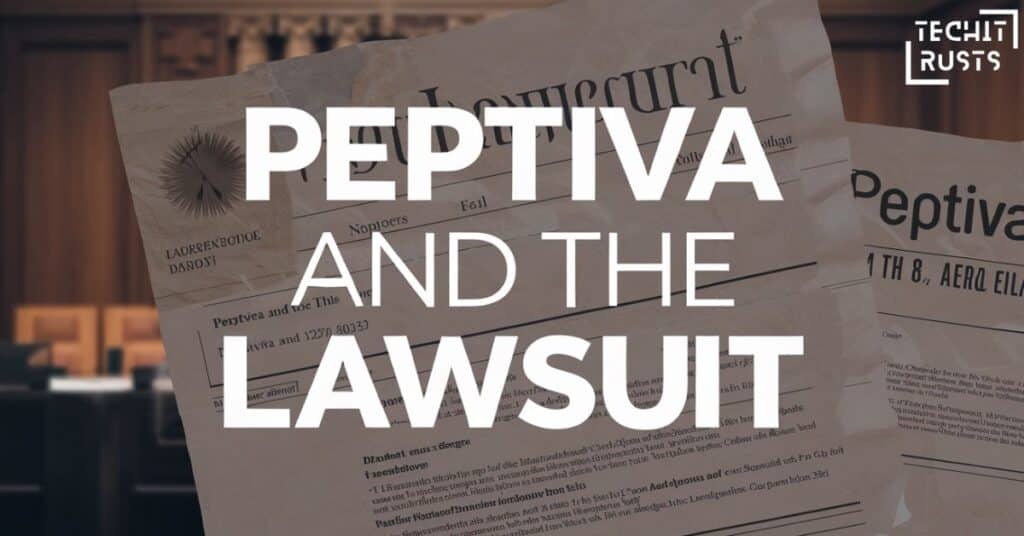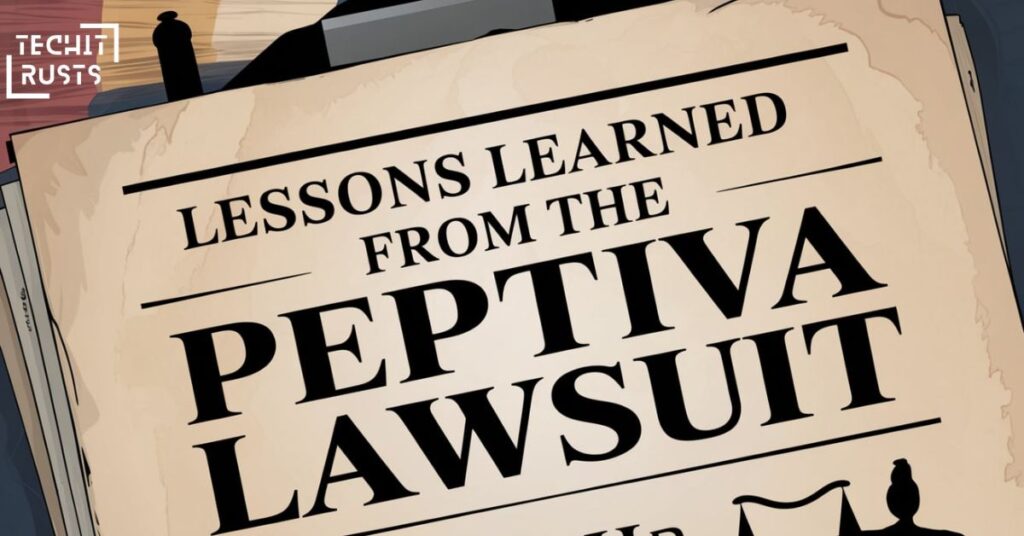The Peptiva lawsuit has emerged as a pivotal moment in the dietary supplement industry, bringing to light significant concerns about health product transparency and ethical marketing practices. As consumers increasingly rely on supplements for wellness, the Peptiva legal issues highlight the importance of clarity, truthfulness, and integrity in advertising.
This blog post delves deep into the lawsuit’s key allegations, consumer impact, and broader industry implications, equipping readers with a comprehensive understanding of the situation.
Introduction to Peptiva and the Lawsuit
Peptiva is a well-known brand in the dietary supplement market, particularly recognized for its probiotics and sleep aid products. With claims of enhancing digestive health and improving sleep quality, Peptiva attracted a loyal customer base. However, the brand recently found itself at the center of a major lawsuit that challenges its marketing strategies and product claims.

The lawsuit alleges a range of unethical practices, from misleading marketing claims to deceptive billing practices. As these allegations unfold, consumers are left questioning the integrity of the products they trust. This case has garnered the attention of consumer advocacy groups and regulatory bodies alike, as it raises critical issues about consumer protection and ethical business practices in the supplement industry.
Key Allegations in the Peptiva Lawsuit
The Peptiva lawsuit is multifaceted, with several key allegations that underline serious concerns about the brand’s operations. Here, we break down the major claims against Peptiva.
False Advertising Claims
One of the primary allegations against Peptiva revolves around false advertising. The lawsuit contends that Peptiva made unsubstantiated claims regarding the health benefits of its products.
For instance, the brand claimed that its probiotics could significantly enhance digestive health and immunity, without providing adequate scientific evidence to support these assertions.
Consumers rely on product claims when making purchasing decisions, and misleading advertisements can lead to consumer trust loss. A survey conducted by the FTC showed that 75% of consumers believe that all health claims made by supplements are backed by scientific evidence. This situation poses ethical concerns as brands can exploit this trust without accountability.
Deceptive Billing Practices
Another significant issue raised in the Peptiva lawsuit is related to deceptive billing practices. Many customers reported being charged unauthorized fees after signing up for Peptiva’s subscription services.
- Unauthorized Charges: Customers often found themselves enrolled in auto-renewal programs without their explicit consent. Once enrolled, they received ongoing charges for products they did not intend to purchase.
- Subscription Service Complaints: Reviews and feedback from Peptiva customers on various platforms indicate widespread frustration regarding these billing practices. Many reported difficulties in canceling their subscriptions or receiving refunds, which led to numerous subscription service complaints.
These practices violate consumer trust and undermine the ethical principles that should guide any business, especially in the health sector.
Inadequate Product Disclosure
The lawsuit also highlights product labeling issues and the lack of transparency in ingredient disclosure. Customers alleged that Peptiva failed to adequately inform them about potential side effects and the ingredients in their products.
- Probiotics Side Effects: While probiotics are generally considered safe for most individuals, they can cause side effects in some cases, including bloating and digestive upset. Peptiva’s failure to disclose these possible side effects raises questions about its commitment to health product transparency.
- Misleading Marketing Claims: Additionally, some customers argued that the labeling of certain products misled them regarding the actual health benefits, further compounding the concerns surrounding Peptiva’s marketing tactics.
Timeline of Critical Events
To understand the Peptiva lawsuit fully, it’s essential to look at the timeline of events leading to the legal action:
- Product Launch: Peptiva’s products gained popularity soon after their launch, touted for their supposed health benefits.
- Consumer Complaints: Initial complaints about misleading advertisements and unauthorized charges began surfacing within months of launch.
- Legal Action Initiation: By late 2022, significant complaints prompted legal action, with a class-action lawsuit filed against Peptiva, alleging deceptive marketing and billing practices.
- Ongoing Developments: The case has continued to unfold in 2023, with updates regarding court proceedings and Peptiva’s responses to the allegations.
This timeline not only highlights the progression of the case but also underscores the mounting frustration among consumers who felt deceived.
Legal Framework and Involved Parties

Understanding the legal framework surrounding the Peptiva lawsuit is crucial for comprehending the gravity of the situation.
Plaintiffs and Legal Representatives
The lawsuit is led by a group of consumers who claim they were misled by Peptiva’s marketing practices. They are represented by legal teams specializing in dietary supplement lawsuits, who argue that Peptiva violated consumer protection laws through its actions.
Laws and Regulations in Question
The Peptiva case raises several important legal questions, primarily revolving around:
- Consumer Protection Laws: These laws aim to protect consumers from misleading business practices. In this case, Peptiva’s alleged false advertising and billing issues could constitute violations.
- FTC Regulations on Supplements: The Federal Trade Commission sets guidelines for advertising in the supplement industry. Peptiva’s practices are under scrutiny for potentially breaching these regulations by making false health claims without proper scientific backing.
Defendants and Peptiva’s Legal Counsel
Peptiva, as the defendant, has enlisted legal counsel to defend against the allegations. The company argues that its marketing practices align with industry standards and that any customer dissatisfaction arises from misunderstanding their policies.
Consumer Reactions and Class Action Status
The Peptiva lawsuit has sparked widespread reactions from consumers, revealing a growing dissatisfaction with the brand.
Public Feedback
Social media platforms and online forums have become hotbeds for Peptiva customer complaints. Consumers share their experiences, often highlighting frustrations with the company’s billing practices and perceived dishonesty in product marketing.
Role of Consumer Advocacy Groups
Consumer advocacy groups have stepped in to support affected customers, urging regulatory bodies to take action against Peptiva. These groups are crucial in bringing awareness to the deceptive marketing practices prevalent in the dietary supplement industry.
Development of Class Action Lawsuit
As the dissatisfaction grew, the legal team representing the plaintiffs filed for a class-action status, allowing multiple consumers to join forces against Peptiva. This development has not only increased the pressure on the company but has also highlighted the collective outrage among consumers.
Peptiva’s Response and Legal Defense
In light of the serious allegations, Peptiva has issued several public statements in its defense.
Public Statements
Peptiva claims that it takes consumer feedback seriously and is committed to transparency. The company denies any wrongdoing, arguing that its marketing practices were within acceptable industry norms. Peptiva maintains that customer misunderstandings, rather than deceitful practices, are to blame for the complaints.
Legal Defenses
Peptiva’s legal counsel has mounted a defense based on the following points:
- Denial of Wrongdoing: The company asserts that its advertising claims are based on established research within the probiotic field.
- Blame-Shifting: Peptiva’s lawyers argue that customers failed to read terms and conditions related to subscription services, implying that customers share responsibility for misunderstanding the policies.
Actions Taken
To mitigate the fallout from the lawsuit, Peptiva has taken steps to improve its practices, including:
- Reviewing Marketing Materials: Peptiva has begun reassessing its advertising to ensure that it aligns with regulatory guidelines and is not misleading.
- Enhancing Customer Support: The company has pledged to improve its customer service processes, particularly in handling subscription cancellations and refund requests.
Impact on Peptiva’s Brand and Reputation

The Peptiva lawsuit has already had a noticeable effect on the company’s reputation and business performance.
Customer Trust Erosion
The allegations of deceptive marketing practices have severely damaged Peptiva’s reputation. Surveys indicate that a significant number of former customers have lost trust in the brand, with many vowing never to purchase Peptiva products again.
Sales Performance
The backlash has translated into decreased sales. Reports show a decline in Peptiva’s product demand, leading to concerns about the company’s financial stability. Many health-conscious consumers are now wary of brands involved in legal disputes over ethical practices.
Changes in Partnerships
Peptiva’s reputation damage has also resulted in lost partnerships. Influencers and retailers are reconsidering their associations with the brand as they aim to align with products that uphold consumer trust.
Broader Consumer and Industry Implications
The implications of the Peptiva lawsuit extend far beyond the brand itself, influencing the supplement industry as a whole.
For Consumers
The Peptiva lawsuit serves as a wake-up call for consumers. They must exercise caution when selecting dietary supplements. Here are some essential tips:
- Research Products Thoroughly: Before purchasing, check reviews and verify claims through trusted sources.
- Understand Subscription Terms: Be aware of auto-renewal policies and cancellation terms to avoid unauthorized charges.
- Stay Informed About Ingredient Safety: Know potential probiotics side effects and other ingredient-related issues before use.
For the Supplement Industry
The Peptiva law may prompt regulatory changes in the supplement industry, particularly in marketing and advertising practices. Key potential changes could include:
- Increased Scrutiny on Advertisements: Regulatory bodies may heighten their oversight of health claims made by supplement companies, requiring more substantial scientific backing.
- More Robust Consumer Protection Regulations: The lawsuit could inspire stronger consumer protection laws to safeguard against misleading marketing and deceptive billing practices.
Case Outcomes and Ongoing Legal Developments

As the Peptiva lawsuit unfolds, the outcomes could set significant precedents for the dietary supplement industry.
Settlement Agreements
If the lawsuit concludes with a settlement, it could include:
- Financial Settlements in Lawsuits: A monetary compensation for affected customers, as well as adjustments to Peptiva’s business practices.
- Commitment to Transparency: An agreement to implement clearer marketing strategies and better consumer communication.
Legal Precedent
The case could establish important legal precedents regarding:
- Consumer Rights: The outcome may reinforce the rights of consumers in the face of misleading marketing practices.
- Industry Accountability: The lawsuit could pave the way for greater accountability among dietary supplement brands, encouraging ethical business practices.
Future Lawsuits
Given the increasing consumer awareness and advocacy, it’s likely that similar lawsuits targeting deceptive practices in the supplement industry will arise, further shaking the industry’s foundations.
Lessons Learned from the Peptiva Lawsuit

The Peptiva lawsuit serves as an educational opportunity for both consumers and businesses.
Importance of Transparency
- Health Product Transparency: Brands must prioritize transparency in their marketing and product labeling to build and maintain consumer trust.
Risks of Aggressive Marketing
- Deceptive Marketing Practices: Companies should avoid aggressive marketing tactics that may mislead consumers about product effectiveness.
Consumer Education
- Understanding Supplement Risks: Consumers need to educate themselves on the potential risks associated with dietary supplements, including melatonin side effects and other ingredient-related concerns.
Future Prospects: Can Peptiva Recover?
As the dust settles from the lawsuit, the future of Peptiva hangs in the balance.
Rebuilding Consumer Trust
To recover from the lawsuit’s fallout, Peptiva must undertake substantial efforts to regain consumer trust. This includes:
- Implementing Better Business Practices: Ensuring transparent marketing and billing practices to eliminate any confusion.
- Engaging with Customers: Actively seeking feedback from consumers and demonstrating a commitment to addressing their concerns.
New Product Developments
Peptiva may consider launching new products or reformulating existing ones to better align with consumer expectations. Incorporating consumer feedback into product development could significantly enhance the brand’s reputation.
Frequently Asked Questions
What is the Peptiva lawsuit about?
The Peptiva lawsuit centers around allegations of false advertising, deceptive billing practices, and inadequate product disclosure, raising concerns about consumer protection and marketing ethics.
What were the allegations of false advertising?
Allegations include misleading claims about the health benefits of Peptiva products, with customers asserting that the company failed to provide sufficient scientific evidence to support these claims.
How did Peptiva’s billing practices deceive customers?
Peptiva is accused of enrolling customers in auto-renewal subscriptions without clear consent, leading to unauthorized charges and frustration among consumers.
Has Peptiva admitted fault or issued refunds?
Peptiva denies any wrongdoing but has taken steps to review its marketing and improve customer service in response to the lawsuit and consumer feedback.
How has the lawsuit affected Peptiva’s reputation and sales?
The lawsuit has led to significant damage to Peptiva’s reputation, resulting in a decline in sales and loss of consumer trust.
What steps has Peptiva taken to address these issues?
Peptiva has begun reviewing its advertising practices and enhancing customer support to better handle complaints regarding subscription services.
What can consumers do to avoid similar problems?
Consumers should research products thoroughly, understand subscription terms, and stay informed about potential side effects of dietary supplements.
What are the broader industry implications of this lawsuit?
The Peptiva lawsuit may prompt increased scrutiny and regulation within the dietary supplement industry, leading to more robust consumer protection measures and greater accountability for companies.
Conclusion
The Peptiva lawsuit encapsulates critical issues within the dietary supplement industry, shedding light on the need for ethical supplement practices and transparency. The allegations of deceptive marketing and billing practices have not only affected Peptiva’s reputation but also raised questions about the industry as a whole.
As consumers become more informed and vigilant, brands must adapt to maintain their credibility and trust. The outcome of the Peptiva lawsuit will undoubtedly shape the future of dietary supplements, influencing marketing strategies and consumer protection regulations.
Ultimately, this case underscores the importance of integrity and accountability in an industry where consumer health and wellness are at stake.
>>>Read Also: Brighton Butler Divorce: A Closer Look At Her Journey Through Separation And Resilience

Ashi is the site admin for “techitrusts.com” and specializes in writing within the journal category. If you need more detailed information about his background or work, feel free to ask!